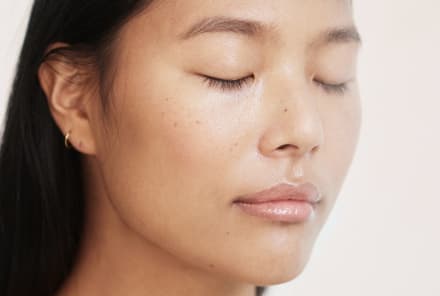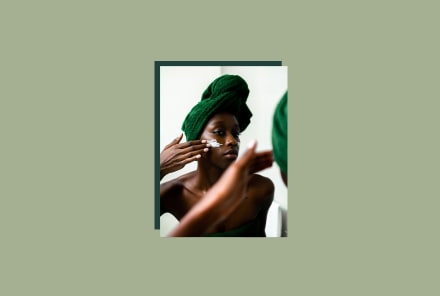Advertisement
Study Shows Scents Can Help Improve Positive Memory Recall & Boost Your Mood


I treat fragrance like heirlooms. Precious little keepsakes that are too sacred to ever part with. Each and every one that finds its way into my fragrance wardrobe is highly curated. And once there, once it’s nestled into my inner circle, it almost never gets the boot.
How could I possibly part with something that I’ve built such a strong relationship with? Yes, even if it is just a bottle of good smelling liquid at the end of the day.
The reason I love these little potions so much is because they are transformative. Fragrance holds so much power: It has the ability to lift you up, remind you of loved ones, make you feel special, and take you to moments you want to cherish forever. I think they’re the closest thing we have to magic—you know, the kind of magic you might read about in fantasy novels.
But the thing is: it’s not fantasy at all. Over the years, research has uncovered the many ways that scent influences our mental and cognitive health. Including a study that looked into the connection between scents, memory recall, and depression management.
Research shows scents cues can trigger memories better than verbal cues
A cross-sectional study published in JAMA Network Open1 looked into what sensory cues were best able to prompt autobiographical memories. More specifically, they looked at verbal cues versus odor cues. The study participants all had major depressive disorder (MDD), which can often make memory recall challenging—especially personal memories.
The team of researchers at the University of Pittsburgh School of Medicine found that the individuals recalled more specific and vivid memories when they smelled familiar scents compared to verbal prompts. However, the memory recall was slower than that of verbal cues—meaning, even if the memories themselves were more robust, they weren’t as immediate.
This discovery aligns with our current understanding of how olfactory memories work. “You actually experience the sense of smell: It triggers our emotions and the memories before you're able to actually process the actual experience or memory," fragrance expert Mindy Yang told us previously.
The science backs this up: Previous research has shown that the amygdala plays a critical role in the formation, retention, and recall of memories2. We also know that the odors can directly engage the amygdala as they are olfactory cortex and amygdala are right next to each other3 in the frontal lobe.
Researchers suggest this can be used in clinical settings
This isn’t just a “nice-to-know” discovery—there’s the potential to use this information when working with patients suffering with depressive episodes, the study authors note.
During the experiment, the researchers had participants smell vials of strong odors—scents like coffee, oranges, or even medicinal products. They then asked the participants to recall a memory. Importantly, they did not indicate whether the memory should be positive or otherwise.
With the scent prompt, the participants were able to share more vivid and specific memories, rather than general associations. And interestingly, the memories shared were overwhelmingly positive.
Not only does this indicate that this could be a tool to help pull individuals out of negative thought spirals, but it may help improve overall cognitive function.
"If we improve memory, we can improve problem solving, emotion regulation and other functional problems that depressed individuals often experience," said Kymberly Young, Ph.D., a neuroscience researcher, associate professor of psychiatry at Pitt., and senior author of the study, said in a press release.
Make a fragrance wardrobe that supports your mental health
This is all the more reason to curate your fragrance wardrobe more mindfully.
The good news is that this is actually quite easy and instinctive. We all gravitate towards notes and scents that are unique to us, our lives, backgrounds, and cultures—so follow your gut. If a perfume smells good to you, don’t overthink it! Enjoy it!
Lots of beauty enthusiasts are doing this already. There’s been a trend of moving away from having one “signature scents” towards wearing fragrance as a mood enhancer. This is largely driven by Gen-Z who, according to a consumer report, tends to own at least three fragrances per individual.
"There's a level of intentionality that's going beyond a results-driven approach," clinical psychologist Chloe Carmichael, Ph.D., told us about the shift. Indeed: Fragrance is now more about the feeling or experience associated with the scent, rather than to simply be noticed.
The takeaway
The intersection of beauty and mental health is one that I will always be passionate about—and endlessly interested in. Beauty, at its best, can be used as a tool to inspire, delight, soothe, and center us. The wonderful thing is that the research is catching up to what many beauty enthusiasts know instinctively: These rituals aren’t just about outward appearance, but mean something much deeper.
So next time you go to spray on a perfume, pick one that will take you to a happy place.
3 Sources
- https://jamanetwork.com/journals/jamanetworkopen/fullarticle/2814989
- https://pubmed.ncbi.nlm.nih.gov/24583373/#:~:text=The%20amygdala%20has%20long%20been,anterior%20medial%20temporal%20lobe%20region.
- https://www.ncbi.nlm.nih.gov/pmc/articles/PMC217997/#:~:text=Importantly%2C%20the%20amygdala%20is%20continuous,upon%20the%20primary%20olfactory%20cortex.
Watch Next
Enjoy some of our favorite clips from classes
Enjoy some of our favorite clips from classes
What Is Meditation?
Mindfulness/Spirituality | Light Watkins
Box Breathing
Mindfulness/Spirituality | Gwen Dittmar
What Breathwork Can Address
Mindfulness/Spirituality | Gwen Dittmar
The 8 Limbs of Yoga - What is Asana?
Yoga | Caley Alyssa
Two Standing Postures to Open Up Tight Hips
Yoga | Caley Alyssa
How Plants Can Optimize Athletic Performance
Nutrition | Rich Roll
What to Eat Before a Workout
Nutrition | Rich Roll
How Ayurveda Helps Us Navigate Modern Life
Nutrition | Sahara Rose
Messages About Love & Relationships
Love & Relationships | Esther Perel
Love Languages
Love & Relationships | Esther Perel


















